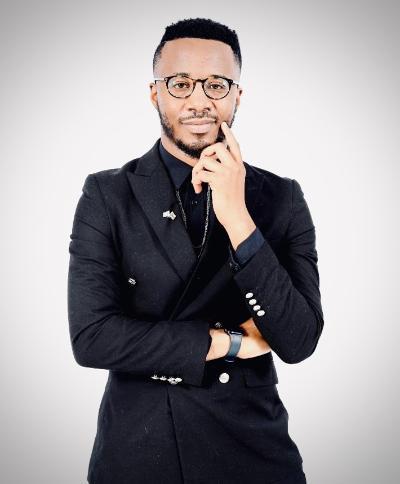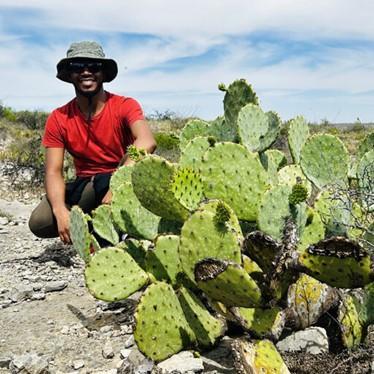Alumni spotlight: Siphosenkosi Mbonani
- Wits Alumni Relations
Fulbright scholar says success is about having purpose and leaving a legacy.
Alien invasive species in Africa cause considerable environmental problems and are listed as the second largest threat to South African biodiversity. This challenge fuels Siphosenkosi Mbonani (BSc Hons 2017, MSc 2019), a recent PhD candidate from the School of Animal, Plant and Environmental Science at Wits.
Mbonani was a recipient of the prestigious Fulbright Foreign Exchange Program in 2023/24 (funded through the National Research Foundation) to conduct research on the population genetics of invasive species in South Africa at the Florida Museum of Natural History at the University of Florida in the United States.
He recently handed in his doctorate on the species Opuntia engelmannii, which has invaded pastureland in the Northern Cape. There are currently no control measures in place and O. engelmannii could potentially decrease the population size of at least one native species and can reduce the productivity of commercial and subsistence grazing. The outcome of his research is of national and global interest.
He kindly chatted with Alumni Relations:
Could you share a bit about your career journey? What drew you to the field?
I was born and raised in Soweto, where I completed my primary and secondary education and graduated with several academic distinctions. Growing up in a community with limited educational resources but rich cultural strength, I developed a deep curiosity about the natural world. I was especially fascinated by how plants grow, adapt, and interact within ecosystems. This early interest sparked my passion for biology.
At the same time, I discovered a strong desire to teach and share knowledge. I often found myself explaining science concepts to friends and classmates, which helped me realise how powerful education can be. My journey was strongly influenced by the support and encouragement of my grandparents, David and Connie Mbonani. Their belief in the importance of education gave me the foundation I needed to pursue my goals. I was also fortunate to have teachers who recognised my potential and motivated me to keep striving, even when faced with the challenges common to many township schools.
My career allows me to protect ecosystems and contribute to biodiversity science while mentoring and teaching students. This combination of research and education has enabled me to give back by empowering future scientists and changemakers.
Where are you currently based and what does your role entail?
I am currently a sessional lecturer at Wits and I was recently appointed as a lecturer at the Southern African Wildlife College in Hoedspruit, Limpopo. In this new role, I will be teaching a broad range of subjects in conservation science, including biodiversity management, ecosystem restoration, and sustainable land use.
My role is both dynamic and deeply meaningful. I teach students from scientific and medical disciplines, using real-world environmental issues to help them connect academic theory with practical, community-focused outcomes.
I am also mentoring undergraduate and postgraduate students, supporting them as they develop research ideas, grow in confidence, and prepare for impactful careers. My research takes me into the field, where I collect data on invasive species and investigate strategies for restoring ecosystems. This is complemented by laboratory and data analysis work that informs practical and policy-driven conservation solutions. At the heart of it all is a core belief that science and education are powerful tools for solving real-world problems and empowering people to lead meaningful change in their communities and beyond.
How have you used your skills or values learned at Wits?
My time at Wits was truly transformative. It was there that I learned to think critically, question deeply, and approach problems with creativity and resilience. The values I embraced at Wits, such as integrity, hard work, and a strong commitment to social impact, continue to guide me in everything I do. The skills I developed in research, teaching, and science communication have enabled me to supervise student projects, engage with communities, and contribute meaningfully to environmental policy.
Wits taught me that education is not just about acquiring knowledge but about using that knowledge to uplift others and create lasting, positive changes in society. My Fulbright scholarship opened doors to valuable collaborations and increased my global relevance. None of this would have been possible without the foundation I gained at Wits.
Do you have a definition of success?
To me, success means making a meaningful and lasting difference in the lives of others. It goes beyond personal achievements. It involves creating opportunities, sharing knowledge, and inspiring others to dream bigger and reach further. I feel successful when I see my students grow into confident researchers or passionate advocates for the environment. I feel fulfilled when my work contributes to better management of natural resources. Success is about having purpose. It is about leaving a legacy that is greater than oneself.
What inspires you?
I am deeply inspired by young South Africans who demonstrate a strong eagerness to learn and a genuine commitment to making a positive impact in their communities and the country. Their enthusiasm and passion remind me that despite the challenges we face, there is always hope for a better future.
I also draw inspiration from my mentors and community members who have demonstrated the importance of perseverance, humility, and selfless service. I am inspired by the transformative power of education. I firmly believe that education can change lives, break cycles of poverty, and open doors to new opportunities. Every moment spent teaching or mentoring is a chance to ignite potential and empower individuals to become changemakers in their own communities and beyond.
What’s the best part of your day?
The best part of my day is the time I spend with students. Whether I am delivering a lecture, mentoring someone on their research project, or working alongside them in the field, these moments of learning and connection are incredibly rewarding. Watching a student’s face light up with understanding or excitement reminds me why I chose this career. It is in these small but powerful interactions when curiosity sparks questions, confidence strengthens, and new ideas begin to take shape that I see the future of science and conservation being nurtured. These experiences not only give me energy and purpose but also reaffirm the impact education can have on individuals and communities.
Any advice for those who have dreams of being a scientist?
Believe in your potential and never stop being curious. Science is about asking questions, facing challenges, and being open to new ways of thinking. Find mentors who believe in you and build a support system of people who inspire and encourage you. Explore opportunities that allow you to grow, such as internships, community projects, volunteering, and research experiences. Most importantly, be distinctive. Do not settle for just getting a degree. Go the extra mile. Let your work, your passion, and your character set you apart. The world needs scientists who are not only skilled but also compassionate, bold, and committed to making a difference. Remember that your journey matters. You have something unique to offer, and with persistence, humility, and vision, you can help shape a better world through science.


